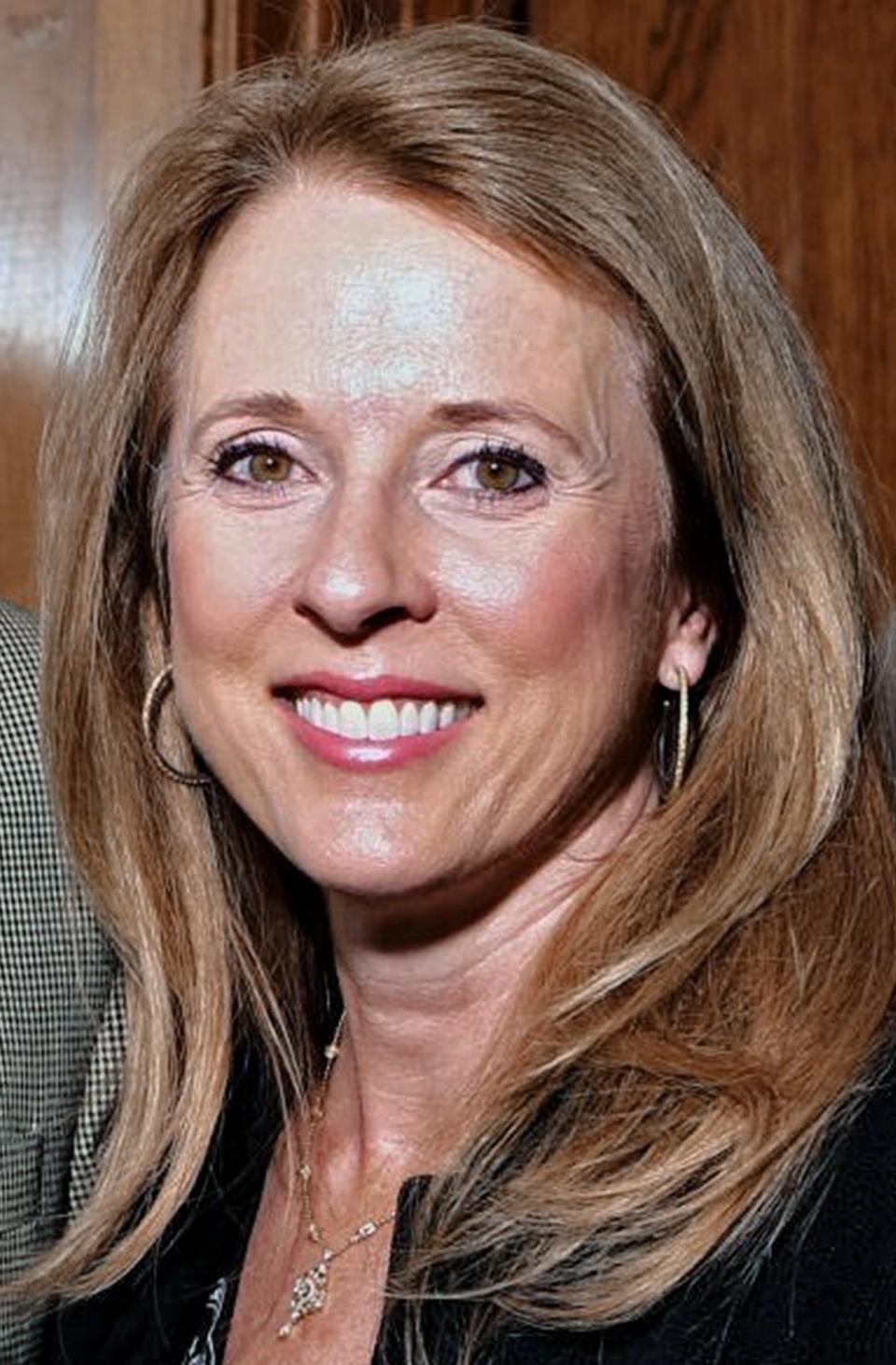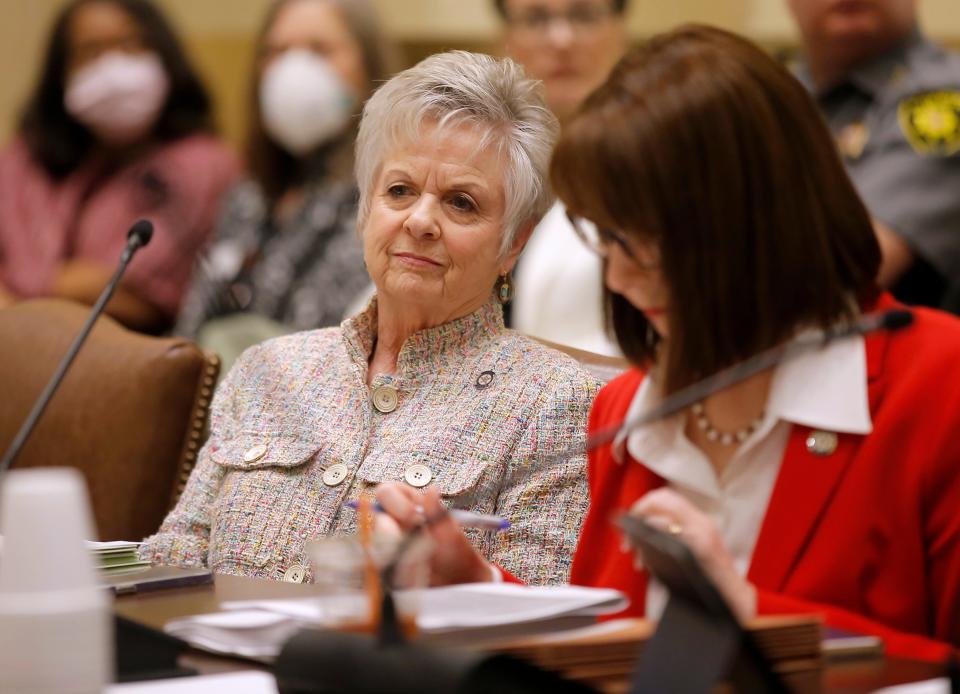A ballot question may be the only way to ease Oklahoma's strict abortion law, but is a movement underway?
Since the U.S. Supreme Court overturned Roe v. Wade last year, several states have taken steps to ease restrictions on abortion, and voters in Kansas rejected a proposed amendment that would have stripped abortion rights from the state's constitution.
But in Oklahoma, which has among the most restrictive abortion bans in the country, a movement to give state voters a chance to change the status quo has yet to get underway. Interviews by The Oklahoman with legislators, members of abortion-rights and anti-abortion organizations, health care professionals and others found general agreement that a citizens initiative is the only pathway to a less restrictive abortion law and some frustration that the campaign has yet to be launched.
Liz McLaughlin, of Oklahoma City, heads We are Rising, a group founded after Roe v. Wade was overturned. With about 10,000 currently "engaging," We are Rising is considered by many to be the group most likely to coordinate a petition effort.
"We would never rule out a state question if that meant protecting access to reproductive health care for Oklahoma women," said McLaughlin, but added: "Our preference is to work with lawmakers to accomplish these goals."

That's not likely to happen.
Many Republicans, who hold a supermajority in the Legislature and occupy the governor's office, believe severely limiting abortion is one of the key reasons they were elected to office. Next year is an election year for some state senators and the entire House of Representatives.
"I have a hard time believing that Republicans would do anything on abortion that would make it seem to their primary base voters that they're doing anything to unwind the ban," said Rep. Cyndi Munson, the Democratic leader in the state House.
More: Oklahoma's abortion ban driving thousands of state women to Kansas, Colorado
Michigan, Arizona, other states go different directions with abortion access
State laws have determined the legality of abortion since the U.S. Supreme Court decided last year to overturn its 1973 ruling, Roe v. Wade, which had held that abortion rights across the country were secured by the U.S. Constitution.
Since that decision, voters in Michigan, Vermont and California have backed constitutional amendments easing access to abortion. Ohio voters will decide on such a measure in November, and a coalition of advocacy groups in Arizona have launched an effort to put a constitutional amendment on the state's ballot next year. Although details are not final, the proposed Arizona amendment is expected to guarantee the right to an abortion before fetal viability and after viability if a doctor determines it is necessary to protect the physical or mental health of the mother.
In Kansas the state Supreme Court had ruled in 2019 that the state constitution gave women bodily autonomy and therefore the right to terminate a pregnancy. Anti-abortion advocates were able to get an amendment on the ballot to remove that right, but it was soundly rejected in August 2022.
In Oklahoma, two rulings by the state Supreme Court in March and May struck down three overlapping abortion bans passed by the Legislature in in 2022. Attorney General Gentner Drummond said the law in force today is the one adopted in 1910, just three years after Oklahoma became a state.
More: Oklahoma Supreme Court strikes down two state abortion bans
That law, Drummond said, is consistent with an inherent right in the state constitution for a woman to terminate a pregnancy to save her own life and does not require a "medical emergency."
State Sen. Julie Daniels, of Bartlesville, the Republican party's floor leader in the Senate, drafted and led the effort to pass the bills overturned by the state Supreme Court this year. She called that decision "appalling." She feels now that the 1910 law needs to be updated — but only to add exceptions for rape and incest, as long as they have been reported.

In addition, she says, the law may need to be clarified to specify the circumstances that would justify intervention to preserve the life of the mother. But she's not in favor of other changes, including the impact of a pregnancy on the mother's mental health.
"We in the 'pro-life' movement do not believe that the threat of mental illness justifies the killing of an unborn child," she said.
McLaughlin calls 1910 law "dangerous and deadly to the health and well-being of women."
"There is no doubt that women will die from the lack of access to reproductive health care that has occurred as a result of this law being on the books," McLaughlin said.
A state question on abortion could get around the Oklahoma Legislature. How does it work?
Getting around the Legislature is exactly what the framers of the original 1907 Oklahoma Constitution had in mind.
According to the Oklahoma Historical Society, Oklahoma achieved statehood during the "Progressive Era," when several states approved citizen initiative and referendum provisions for "direct democracy as an obstacle to special-interest-group control of government."
Getting a state question on the ballot is not an easy process, says Rep. Mickey Dollens, D-Oklahoma City. For one thing, initiating a change in the state constitution requires about 170,000 signatures on petitions that must be reviewed by the secretary of state's office and can be challenged for their validity.
And the process could get harder, he said, because legislators likely are to propose changes in the next session that would raise the percentage of votes required for approval beyond a simple majority or require a certain number of petition signatures from every Oklahoma county.
Dollens has won approval to hold a special interim study of the initiative process that will have its first meeting next month.
Finding a middle ground on abortion would be a challenge
Chip Paul, who led a successful effort to legalize medical marijuana in Oklahoma in 2018 (it passed by a 57% margin), said he had two pieces of advice for We are Rising or any other group seeking to pass a citizens initiative: "Keep it a grassroots effort and find the 'sweet spot.'"
Paul said the 2018 success came "because we didn't use a professional signature collection company and had our own people out all over the state."
A state question to approve recreational marijuana in Oklahoma failed earlier this year because of strong opposition from rural counties.
"I think people outside Tulsa and Oklahoma City would approve a change (in the state's abortion law), but you have to be out there talking to them," Paul said.
And he said he thought it would be a challenge to find the sweet spot — an abortion law that might not satisfy abortion-rights or anti-abortion activists, but would approximate the balance many felt had been achieved before Roe v. Wade was overturned.
More: After Oklahoma Supreme Court struck down two abortion bans, one law remains. Here's what it says.
In 2014, a poll by the Pew Research Center found that 51% of adults in Oklahoma thought that abortion should be legal in all or most cases, while 45% thought it should be illegal in all or most cases and 4% did not care.
A more recent poll, conducted by Amber Integrated in 2022, found that 55% of Oklahoma voters did not want a total ban on abortion.
"This shows that most voters cannot simply be placed into a 'pro-life' or 'pro-choice' dichotomy, said a partner in the Amber polling company. "Voters have a wide range of beliefs that lie between a 100% ban on abortion and allowing abortion up to the point of birth."
"It's going to take a lot of work and a lot of money to figure that out," said Munson, the Democratic House leader. "Oklahomans are definitely on a big spectrum of where they stand."
Private polling is taking place, several people told The Oklahoman, although they asked to be kept "off the record."
Several of those interviewed by The Oklahoman said they were ready to back a citizens initiative for change in the existing law, but understood that it was a complicated process and would take time to develop.
Leslie Batchelor, an attorney and president of the Center for Economic Development and Law, said "One reason we may not be hearing anything is that even though it’s an initiative by 'citizens,' it actually requires a significant organization and funding to collect enough signatures to get a measure on the ballot. It’s a pretty major undertaking."
Dr. Dana Stone, an obstetrician and gynecologist in Oklahoma City, and a strong proponent of leaving abortion decisions to women and their doctors, said she wasn't involved in discussions about announcing plans for an initiative petition. But she said, "I understand that some people feel we need more time to get some education to Oklahomans so they are well informed before a vote would be advisable."
"We believe that a vote to protect abortion access will be successful in our state," said Tamya Cox-Toure, head of Oklahoma's chapter of the American Civil Liberties Union. "But it must be strategic and thoughtful."
Pushed to say when We are Rising might be ready to follow in the footsteps of other states going directly to the voters for a new abortion law, McLaughlin said:
"We aren't going to base decisions on when to move forward with a ballot measure on what other states are doing.
"We're committed to getting this right and ensuring that in the long run, we protect access to reproductive health care for women and that means continuing to do what we are already doing — educating Oklahomans about the perils of our extreme laws and creating a movement of people from every corner of the state of all political stripes to say enough is enough. Oklahoma women deserve better."
This article originally appeared on Oklahoman: Is a state question to ease Oklahoma abortion restrictions possible?

